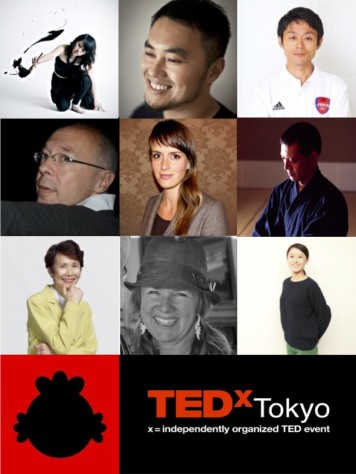TEDxTokyo 2014 Speaker: D for Design
Last—but certainly not least—let us introduce our speakers and performers in D: Design.
The single word “design” covers a lot of genres. Let’s take a closer look at unique ways that our speakers and performers employ the power of design to make change in society.
Aoki Jun (Home Coordinator)
Dwellings are—and must be—defined by the way people interact with their city, other people, and the time in which they live. Customizing your house empowers you to design your life.
As an early advocate of and expert in customized rental properties, Jun Aoki has been transforming previously-owned houses into tastefully customized homes. However, it is not Jun that governs this process. Jun believes that the protagonists of this story of change must be the residents. Jun’s work reveals the important function of houses in choosing how to style our own lives.
Aoi Yamaguchi (calligrapher)
“Letters pulse with a beating rhythm,
with which calligraphers’ bodies resonate,
and the spirit and life reside with the words they write”
Letters are not just two-dimensional symbols. Letters can express a sense of time, passion, emotion, stillness or the motion of the writer. Aoi Yamaguchi performs calligraphy around the world to explore the spiritual connection between us and those who came before us.
Jesper Koll (Optimist & explorer of the Japanese economy)
Being optimist means finding new potentials
Jesper Koll, who has been studying Japanese economics for over two decades finds the potential of Japan in its entrepreneurs and start-up firms. By connecting policy makers and investors, Jesper aims to bring Japan back to the center stage of the international society once again.
Toshio Tanahashi (Shojin cuisine chef)
Embrace and appreciate simple food
An essential attitude to realize the spirit of Shojin
“Simple, vegetarian food became increasingly important for modern people”, says Toshio Tanahashi, a chef of traditional Buddhist monks’ vegetarian cuisine, known as “shojin ryori”. Food and spirit are deeply interrelated in Buddhist culture. Toshio aims to revive traditional Japanese food culture, reminding the Buddhist spirit of “finding liberty within constraints.”
Yoko Ishikura (Professor of Business studies)
Boy and girls, be ambitious!
Yoko Ishikura aims to realize a society in which anyone who wants to learn can learn regardless of their gender, race, age, location and financial background. She develops learning experiences that nurture individuals and communities both online and offline. Based on her experiences as the first women who obtained DBA at Harvard Business School and as a former manager at foreign-owned consulting firm, Yoko fosters people who will be able to contribute to the global society.
Marian Goodell (CEO, Burning Man)
One week in August, a city emerges in the middle of Nevada’s Black Rock Desert.
It is the crystallization of Burning Man’s participants’ spirit of community, art, self-expression, and self-reliance.
Burning Man is the project established by Marian Goodell, a project that has become a global cultural movement. The participants bring water, food, and camping equipment to live on and experience a week-long intense communal environment. The participants are also asked to express themselves in some way—from creating art to teaching how to bake. After the event, they leave nothing and only the desert remains. Every year, thousands of people partake in this event to take over and extend the Burning Man’s ethos around the globe.
Eigo Matsuzaki (Japan Blind Football Association)
Close your eyes, and you’ll find something that you usually miss.
Eigo Matsuzaki employs blind soccer to create a society where the visually impaired and those who aren’t interact. His work ranges from supporting people with disability to enjoy sports to holding a training session at various companies. Anybody can enjoy blind soccer if they wear eye masks, which is one of the reasons why it has become increasingly popular around the world. Indeed, in November 2014, World Blind Soccer Championship will be held in Shibuya.
Tamako Mitarai (Founder of Kesennuma Knitting)
Knitting connects not only fabric.
It also connects people.
Tamako Mitarai is the founder of Kessennuma Knitting, a firm that produces handmade sweaters and cardigans. Tamako has always focused on doing work in places where her efforts can make a real difference. While she was a student, she worked with NGOs and international volunteer associations. She went on to work at a foreign consulting firm and then became the first Bhutan Prime Minister Fellow. Her current work at Kesennuma will surely contribute to the recovery of city from 2011 tsunami and earthquake.
Amanda Joy Ravenhill (environmental activist)
The surest and shortest way to make a world that works for “100% of humanity” is “spontaneous cooperation without ecological offense or disadvantage to anyone”.
Amanda Joy Ravenhilll believes in the power of business to tackle the issue of climate change, and teaches at Presidio Graduate School in San Francisco. As the Executive Director of Project Drawdown, she has been suggesting more than 100 impeccably researched technologies that reduce green house gas emissions. Amanda is currently working with Paul Hawken on an accompanying book, “Drawdown,” to be published in 2015.
Nakano Hitoyo (Social Media Trend-Setter)
Nakano Hitoyo, a mysterious person who caused a sensation on Twitter with a parody bot account of the nationally recognized character, finally appears in public…?
With philosophical remarks and witty jokes, Nakano Hitoyo’s account exploded to more than 240,000 followers. Nakano Hitoyo has used the account’s popularity to disseminate safety information during the Great East Japan Earthquake. Although the activities are now going offline and into the real world, Nakano Hitoyo’s identity remains a mystery. The wait is over. In order to prevent the destruction of the planet in 2061, Nakano Hitoyo comes on stage of TEDxTokyo!TEDxTokyo 2014 Speaker: D for Design
